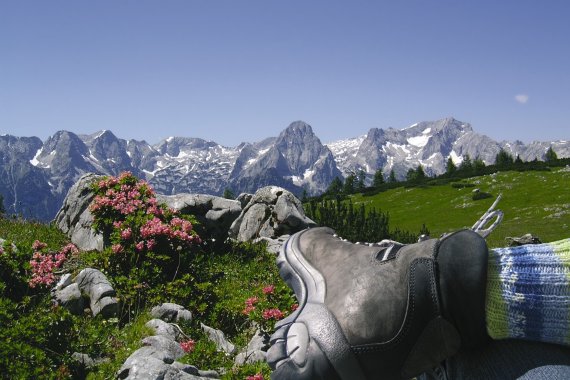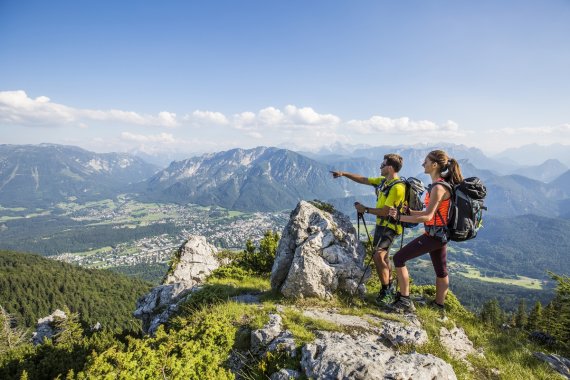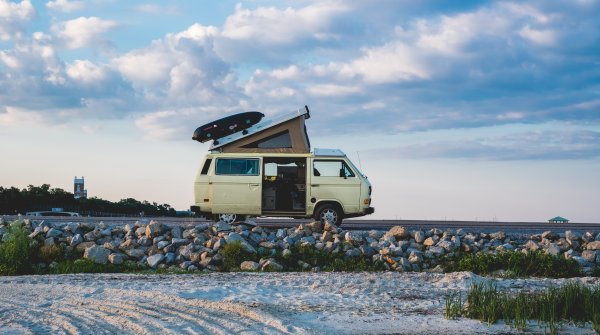In a survey of the German Alpine Association (DAV) among hut hosts*innen with a view to the beginning summer season, the general tenor is that the booking situation is promising. However, the innkeepers are currently facing completely new challenges: The economic situation looks anything but promising. Because the raw material scarcity as well as constantly rising energy and food prices would lead to large uncertainty. Therefore, the hut trip could become a little more expensive. Nevertheless, everything speaks for the fact that the numbers of the Bergliebhaber*innnen continue to rise. Whether in Switzerland, as a study from 2020 proves., or in Austria, where the most popular sporting activity on summer vacation is hiking. According to a study by the tourism organization Österreich Werbung, a total of 65 percent of respondents explore nature in this way. For the majority, namely 47 percent, this is also the or one of the main activities during the stay.
The numbers prove: The mountain world has increasingly become a destination of longing. Mountaineering, mountain hiking, climbing, mountain biking and e-mountain biking are booming. Especially on weekends, there are hardly any parking spaces left near popular peaks. The German Alpine Association (DAV) and the German League for Nature Conservation have long been calling for more sustainable tourism concepts to be developed. The DAV demands: The overriding goal should be to preserve the originality and beauty of the undeveloped alpine landscape.

To travel a distance of 500 kilometers during the day would have to become so unattractive according to the Bund Naturschutz that even the last short-term recreation seekers would refrain from doing so. This can be controlled by means of parking fees, tolls, entrance fees or lift tickets. Increased environmental education must help guests to behave in an environmentally friendly manner. Publicly arrive and stay long, this must be firmly anchored in the consciousness of the guests.
The number of overnight guests has increased by about 37 percent in the Bavarian Alpine communities between 2000 (about 4.5 million) and 2019 (7.2 million), according to Bund Naturschutz. However, in the Oberland south of Munich, for example, there were an average of five day visitors for every overnight stay, but in the Allgäu and southeastern Bavarian Alpine region, there were only three day visitors. Also problematic is that the length of stay has halved over the past 25 years: from twelve to six days.
The tourism association Chiemsee-Alpenland (CAT) sensitizes already longer with different campaigns, in particular to the correct behavior in the Almweidegebiet. It does not only concern a good cooperation between cyclists and hikers, but also the consideration for Almbäuerinnen and Almbauern, and their animals. For the most recent campaign, the tourism association conducted a survey on conflict issues among 200 regional actors from the fields of municipal administration, nature conservation and environmental protection, alpine pasture and agriculture, and the leisure industry. The problem areas "behavior in the alpine pasture area and in the forest, nature conservation, proper parking, the tension between cyclists and hikers, and dealing with dogs" emerged as particularly important areas for action. The results provided the templates for six motifs, which are to draw attention to sensitive areas and conflict situations.

Also to the alpine communities is clear: Enlightenment is the order of the day - with appropriate info campaigns in the media and at the parking lots. "The e-bikers are not yet a problem with us," says, for example, Georg Huber, mayor of the municipality of Samerberg. One reason for this could be that there is a large bike park in the Hochries area. Professional biker Ines Thoma also sees in mountain biking no additional burden on nature, because: "Mountain bikers are looking for the experience of nature, and want to preserve what they love." For the Allgäuerin, the issue of sustainability is an important topic. She pleads for it, also times the closer environment - outdoor on the doorstep - to experience and explore.

"Quality instead of quantity must be our motto," says Mayor Huber. According to him, the existing offers must be maintained qualitatively, sufficiently cared for and maintained. "That is task enough, we do not need new attractions more," he clarifies. "The importance of nature conservation is of great concern to us, because as a local recreation area we live from an intact nature. However, it must not be overloaded. This is a balancing act that we succeed better than in Tyrol, where tourism enjoys too many freedoms." And mountain hiking guide Josefine Lechner becomes even more drastic: "The development that everything is subordinated to tourism, I see with concern."
But: Georg Hörhager, chairman of the tourism association Kufsteinerland, relies heavily on visitor management to relieve burdened regions. According to him, a concept for the Kaisergebirge was developed together with the tourism association St. Johann, in order to serve different groups such as hikers, cyclists and tourers in the best possible way, and to find solutions for various stakeholders (forestry, landowners, huts, protected area officers, locals, communities).

To go to the mountains with public transport - that works very well in some regions. Nevertheless, Mayor Huber, for example, regrets that the hiking bus is too little accepted despite intensive advertising. "The nature lover is too comfortable to arrive by public transport, but of course in the countryside anyway only sparsely, especially on weekends on the road." The municipality therefore offers a hiking bus that connects Rosenheim district municipalities with the Samerberg twice a day on Sundays and holidays from May to October. "Normally that also works out that you can reach the trains to Munich." Alpenwelt Karwendel is also easy to reach by bus. Those who want to go to the Kaisergebirge hiking area in Tyrol can switch to the train and avoid any traffic jams on the A8. More information is available on the Website of the DAV.

Mountain hiking guide Josefine Lechner leads tours for various organizers throughout the year in the Alpine counties of Traunstein, Berchtesgadener Land and Rosenheim. She meets with her participants* mostly at parking lots near the highway, to then drive with fewer cars to the hiking parking lot.
Lechner also recommends avoiding the "hotspots" in particular on weekends. "Here in our area, for example, these are Hochries, Kampenwand, Hochfelln - that is, all mountains whose peaks can be reached by train. Or advertise special dishes at the huts." Because more people in one spot increases the pressure on the mountains enormously, according to her. And in order to be able to provide well for all guests at these hotspot huts, not only are new driveways built, but then "it also needs electricity, water, sewage and much more," warns the 57-year-old from Chiemgau. She finds it even more extreme that events on huts and new gastronomic concepts, such as for the Frasdorfer Hütte, are increasing. Nature gets with enterprise into the night at all no more chance to the recovery.
With the participants*innen of their home discovery tours Josefine Lechner goes between 9 and 16 o'clock into the mountains. "Then everyone should generally be down from the mountain, so that animals and plants can recover." For a long time, the night was the time when nature and the fauna living in it could recover, also states the Bund Naturschutz. This has now changed considerably. Many organized sporting events, such as 24-hour hikes and night trails, attract people outdoors. Mountain bikers*innen and hikers, who visit mountain huts and mountain inns at night, would take their important rest function from the night.

The times when there were just a few different dishes on the mountain huts are long gone. Nevertheless, each*r should remember that the food must somehow come to the hut. For some even by helicopter, for others at least by car. Regional and seasonal ingredients are definitely more sustainable than imported food. Likewise, a vegetarian snack minimizes CO.span>₂ footprint. Climate-friendly it is also to prepare the snack times, and to eat on the mountain top with relish. Energy bars, for example, are easy to make yourself.

The Alpine clubs in Austria, Germany, South Tyrol, Italy and Slovenia, for example, cooperate in the so-called mountaineering villages. - "original mountain villages to enjoy and to stay". The localities united in the initiative are pioneers in their regions, according to the DAV. Here the mountains and mountaineering would have a high value in the cultural self-image of the locals and guests, and the awareness of the necessary harmony between nature and man is alive. In 2022, there are already 35 mountaineering villages (in Germany Ramsau bei Berchtesgaden, Schleching, Sachrang, Kreuth). That is, these communities have no mass tourism, no ski areas with complete snowmaking developed to perfection, no après-ski parties or resource-guzzling events on offer. They are united by one goal: to make nature-based and resource-conserving tourism competitive.

This goal is also pursued by the network for climate-friendly vacations in the Alpine region called "Alpine Pearls" (supported among others by the European Union). The members are committed to implementing innovative, soft-mobile tourism concepts for their guests. They offer special offers for a vacation without own car with full mobility guarantee. This begins already with the car-free journey with course and bus. On site, shuttle services, hiking buses, cabs, e-cars, bicycles and e-bikes ensure the guests' soft-mobility freedom of movement. Mobility cards offer the free use of public transport..In Germany, the towns of Bad Reichenhall and Berchtesgaden are "Alpine Pearls". In total, there are 19 places in five countries (Germany, Austria, Italy, Switzerland, Slovenia).


 OutDoor by ISPOOutDoor in transition
OutDoor by ISPOOutDoor in transition
- Awards
- Mountain sports
- Bike
- Fitness
- Health
- ISPO Munich
- Running
- Brands
- Sustainability
- Olympia
- OutDoor
- Promotion
- Sports Business
- Textrends
- Triathlon
- Water sports
- Winter sports
- eSports
- SportsTech
- OutDoor by ISPO
- Heroes
- Transformation
- Sport Fashion
- Urban Culture
- Challenges of a CEO
- Trade fairs
- Sports
- Find the Balance
- Product reviews
- Newsletter exclusive area
- Magazine





